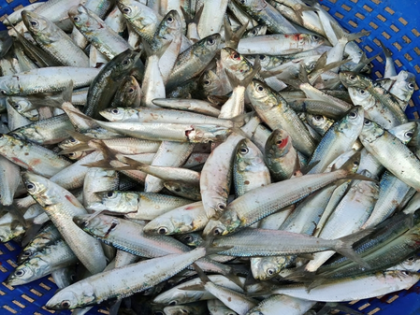CMFRI sets ambitious 25 lakh tonne mariculture target by 2047
By IANS | Updated: October 11, 2025 17:15 IST2025-10-11T17:11:28+5:302025-10-11T17:15:11+5:30
Kochi, Oct 11 The ICAR-Central Marine Fisheries Research Institute (CMFRI) has unveiled an ambitious plan to scale up ...

CMFRI sets ambitious 25 lakh tonne mariculture target by 2047
Kochi, Oct 11 The ICAR-Central Marine Fisheries Research Institute (CMFRI) has unveiled an ambitious plan to scale up India’s mariculture production to 2.5 million tonnes by 2047.
This is a major leap from the current output of around 1.5 lakh tonnes.
The initiative aims to meet the country’s rising seafood demand and reduce pressure on traditional capture fisheries.
Announcing the plan, CMFRI Director Grinson George described mariculture as “the next big thing” in India’s marine fisheries sector.
He highlighted that technologies such as cage culture and Integrated Multi-Trophic Aquaculture (IMTA) will play a key role in boosting production.
He was speaking at the launch of the Central government’s Pradhan Mantri Dhan Dhanya Krishi Yojana (PM DDKY) at CMFRI on Saturday.
India currently produces an average of 3.5 million tonnes from marine capture fisheries annually.
With climate change and resource depletion posing significant challenges, CMFRI is betting on alternative systems like mariculture to ensure future seafood security.
“To meet growing domestic and export demand, India is targeting at least 25 lakh tonnes of mariculture production by 2047,” Dr. George said.
He added that India has immense potential in seaweed farming, a high-value segment in mariculture.
While global seaweed production is around 35.5 million tonnes, India’s output remains minimal.
“We can achieve at least 5 million tonnes domestically to meet industrial and nutraceutical demand,” he noted.
Dr. George also emphasised the need for a robust national mariculture policy and a supportive legal framework to enable sustainable, large-scale investments.
With a long coastline and favourable marine conditions, India, he said, is well-placed to become a global mariculture hub.
The training session covered mussel and oyster farming, cage and pen culture, biofloc systems, and innovative feed production using black soldier fly larvae. Inputs were distributed free to Scheduled Caste and Scheduled Tribe beneficiaries.
Disclaimer: This post has been auto-published from an agency feed without any modifications to the text and has not been reviewed by an editor
Open in app